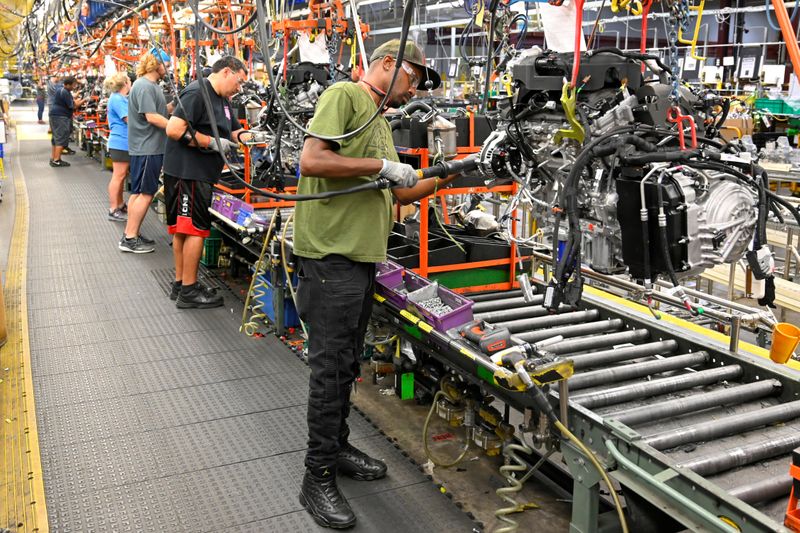By Lucia Mutikani
WASHINGTON (Reuters) - U.S. factory manufacturing activity slowed in February as new orders contracted, reflecting worries about supply chain disruptions related to the fast-spreading coronavirus outbreak, which has revived financial market fears of a recession.
While other data on Monday showed construction spending increased by the most in nearly two years, hitting a record high in January, the upbeat news was overshadowed by the coronavirus epidemic. Global stock markets have tumbled, with Wall Street's key indexes suffering their worst week since the 2008 global financial crisis last week. The yield on the two-year Treasury note fell below 1% for the first time since 2016.
Investors worry the flu-like virus could derail the longest economic expansion on record, now in its 11th year. Federal Reserve Chair Jerome Powell on Friday described the U.S. economy's fundamentals as "strong," but acknowledged that "the coronavirus poses evolving risks to economic activity," and said the U.S. central bank would "use our tools and act as appropriate to support the economy."
"It is more critical than ever for companies to get those supply chain inputs used in production from China, otherwise the manufacturing sector may indeed fall back into a recession," said Chris Rupkey, chief economist at MUFG in New York.
The Institute for Supply Management (ISM) said its index of national factory activity fell to a reading of 50.1 last month from 50.9 in January. Economists polled by Reuters had forecast the index would slip to 50.5 in February.
A reading above 50 indicates expansion in the manufacturing sector, which accounts for 11% of the U.S. economy.
The ISM index pulled above the 50 threshold in January for the first time in five months, as trade tensions between the United States and China eased following the signing of a partial deal that month. But the coronavirus epidemic, which has killed at least 3,000 people and infected more than 80,000, most of them in China, is a new threat for factories.
Data and some regional Fed factory surveys had hinted at some stabilization in manufacturing after it slumped last year. With manufacturing barely expanding, that could put pressure on the Trump Administration to suspend all U.S. tariffs on Chinese imports.
The ISM said "global supply chains are impacting most, if not all, of the manufacturing industry sectors." About six industries, including computers and electronics, fabricated metal and chemical producers, reported the coronavirus outbreak was impacting their businesses.
Reports from around the world on Monday also showed factories taking a beating from the coronavirus outbreak, with activity in China shrinking at a record pace. Japan's PMI showed its factory activity was hit by the sharpest contraction in nearly four years in February. In South Korea, factory activity also shrank faster in February.
In addition to fracturing the supply chain and undercutting exports, the outbreak has led to a slowdown in travel plans that is also seen hampering the services industry.
Apple (O:AAPL) last month warned investors it was unlikely to meet revenue targets for the first quarter of 2020 and that global iPhone supplies would be limited as manufacturing sites in China were not ramping up production as quickly as expected.
The ISM's forward-looking new orders sub-index dropped to a reading of 49.8 in February from 52.0 in January. A measure of exports orders fell last month and a gauge of imports tumbled to its lowest level since May 2009. The shortage of raw materials was underscored by a sharp rise in the length of time suppliers are taking to deliver inputs.
"Parts are scarce at an increasing number of companies," said Chris Low, chief economist at FHN Financial in New York. "The White House should suspend all Chinese tariffs immediately, it won't do a whole lot of good at this point, but it cannot hurt and President Trump can always re-impose them later.
The ISM's factory employment index remained in contraction territory in February, suggesting manufacturing payrolls could remain weak after declining in December and January.
A separate report on Monday from the data firm IHS Markit showed its final U.S. Manufacturing Purchasing Managers' Index slid to 50.7 in February from 51.9 in January.
U.S. stock indexes rose on Monday, recouping some of last week's losses, on bargain hunting and hopes that monetary stimulus from central banks would help tide over the potential economic impact of the coronavirus. Prices of U.S. Treasuries were trading higher while the dollar (DXY) fell against a basket of currencies.
'MAD DASH'
The ISM said 14 industries reported growth last month, while three contracted. Manufacturers of computer and electronic products said the "coronavirus is wreaking havoc on the electronics industry," adding "it's a mad dash to dual source stateside in case China isn't back online soon."
Chemical products manufacturers said the coronavirus and Boeing's (N:BA) decision to suspend production of its troubled 737 MAX airplane had "suppressed new orders." Manufacturers of food, beverage and tobacco products warned of weaker demand for goods made in China as well as "significant delays to production," because of supply bottle necks.
A third report on Monday from the Commerce Department showed construction spending surged 1.8% to a record high of $1.369 trillion as investment in both private and public projects increased.
But economists worried the coronavirus could stunt growth.

"Mild weather and low rates are giving construction a boost," said Mark Vitner, a senior economist at Wells Fargo (NYSE:WFC) Securities in Charlotte, North Carolina. "However, supply chain disruptions stemming from the coronavirus may exert upward pressure on a wide array of imported materials prices, ranging from steel and cement to fixtures and furnishings, and hamper activity."